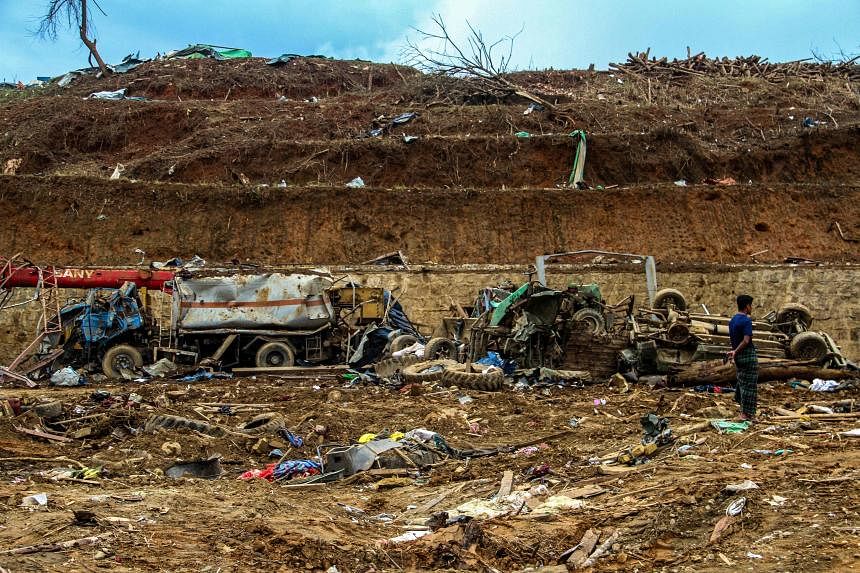BANGKOK – Myanmar’s junta is preparing to commemorate the eighth anniversary of a Nationwide Ceasefire Agreement (NCA) with ethnic armed groups on Sunday, even as the nation reels from the shock of more than 29 civilians in the north being killed on Monday after an alleged bombing by the military.
Such dissonance underscores the reality that genuine peace dialogue among the key armed groups in Myanmar remains a distant prospect. If anything, the locals are grappling with an increasingly fractured political landscape.
With the military preoccupied with battling new resistance groups that have emerged in response to the February 2021 coup, several existing ethnic armed groups have expanded or consolidated their control.
Meanwhile, public sentiment remains opposed to peace talks amid scorched-earth tactics by the military: At least 86,000 houses and buildings – including religious buildings – have been torched and destroyed since the coup, according to the Institute for Strategy and Policy Myanmar.
In the latest attack, a camp for displaced people in Kachin state near the Chinese border was hit by explosions, killing more than 29 people – 11 of them children. The Kachin Independence Organisation, an ethnic insurgent group, claims the strike was conducted by the military. The junta has denied responsibility, and suggested that this was caused by stockpiled explosives.
The fault lines in Myanmar’s conflict are increasingly being blurred. While the junta has kept the door open for talks with ethnic armed groups, it has rejected the numerous anti-coup “people’s defence forces” (PDFs) as terrorists. But the Karen National Union (KNU) and Chin National Front – two of the original eight signatories of the NCA – are actively fighting the military and have even helped train the PDFs.
The military is finding it hard to hold its ground. A September 2023 report by the Karen Peace Support Network, comprising 30 civil society organisations in Myanmar and Thailand, claimed that the junta has lost control of 62 military camps as well as over 370 schools in the south-east since the coup. The schools are now governed by the KNU’s education department.
This conflict is taking place amid deepening violence.
A June 2023 report released by the Peace Research Institute Oslo found that over 6,000 civilians were killed in the 20 months after the coup. At least 3,000 civilians were killed by the military and its affiliates, while 2,152 were the work of PDFs, anti-junta resistance groups, and ethnic armed organisations, primarily through targeted killings, the report said.
“A culture of violence has emerged in previously peaceful regions, with widespread acceptance of torture and murder against combatants, but also civilians,” the report noted.
Given the current circumstances, Ms Ying Lao, executive director of the Salween Institute for Public Policy, says the NCA is dead in the water: “The NCA is based on the 2008 Constitution, which the people have expressed their desire to no longer have anything to do with.”
Myanmar’s 2008 Constitution laid out a power-sharing framework between an elected government and appointed military representatives. This was denounced by protesters after the coup, which toppled the elected National League for Democracy government.
But Dr Min Zaw Oo, executive director of the Myanmar Institute for Peace and Security, argues that “the NCA still has a significant role in the future because it is the most comprehensive peace process agreement Myanmar ever had”.
The deal stipulates commitment to a democratic and federal union, he pointed out, which makes it the only written agreement which explicitly mentions federalism in the country’s history.
Meanwhile, despite the armed conflict, no NCA signatory has officially nullified the agreement, said Mr Morgan Michaels, a research fellow at the International Institute for Strategic Studies in London.
“They keep it as a safety valve. In the absolute worst-case scenario, if the war went completely south, they would have a process that they could buy back into that the military would accept.”
The military’s conflict with the ethnic armed groups is “escalating or continuing along a very high trajectory”, he said.
“The military is still capable of waging new offensives in different areas. It is capable of moving forces and supplies across the country. But it has a difficult time, when it launches new offensives, to then finish them or to achieve its objectives. That is an indicator that points towards prolonged protracted conflict at what is, for Myanmar standards, relatively high intensity.”
Keeping the NCA alive – even if in name – allows the junta to demonstrate its commitment to peace, even if it is more than willing to use force to get what it wants. “There is a lot of doubt about the military’s performance, more doubt about its intentions when it discusses peace, but I don’t think there can be much doubt about this regime’s resolve on the battlefield,” said Mr Michaels.


